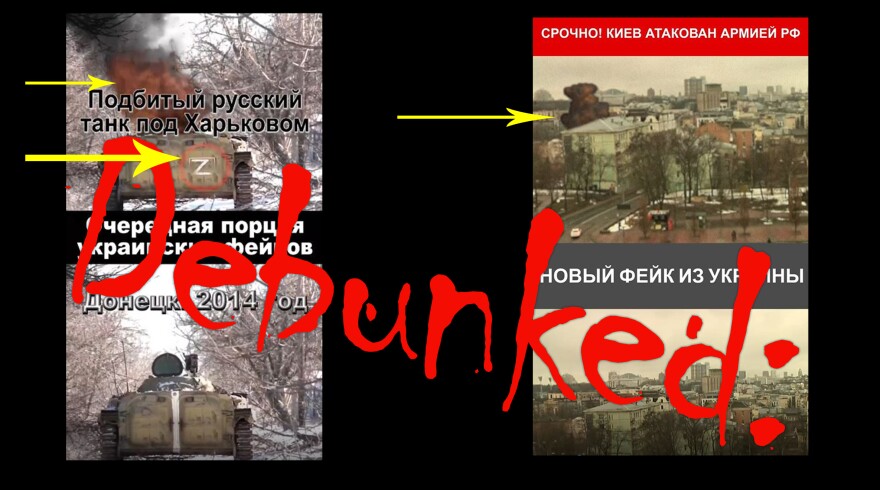Think you could spot low-grade CGI flames on a video of a tank? How about the ‘Z’ that looks like it got slapped on with digital masking tape?
Sure you could. Thing is, you’re meant to.
In Dr. Patrick Warren’s office at Clemson University, the economist-slash-BS finder – he’s a co-founder of Clemson’s Media Forensics Hub – and I check out some video memes he’s captured from a few pro-Russian telegram sites and social media accounts. They’re not very convincing fakes, but, again, they’re not supposed to be. These fakes, like the aforementioned armored vehicle on fire, are supposed to look fake.
Without trying to be too confusing, it works a little like this: Russian propagandists took video of a Ukrainian armored vehicle – in this case one covered in a bramble of generic-looking graffiti – and cleaned the image up. Then they digitally added a ‘Z’ to the vehicle, Z being a symbol of support for Russian forces in Ukraine. Then they added CGI flames and smoke to the image, before finally sharing it online with a message charging Ukrainian media with sharing a false flag.
So it’s a real image that’s been altered and then faked on top of that; and the reason it’s made to look so obviously phony is because the propagandists are trying to convince people that Ukrainian media outlets are trying to pass off doctored images as real news items, Warren says. It’s an effort to undercut faith in Ukrainian media, to show that the country cannot be trusted.
What’s surprising to Warren is that these altered videos, memes, and images are purporting to be fact checks – something that is supposed to convey trusted, vetted information.
So yes, if you’re keeping score, it’s a phony fact check of a phony video that’s been obviously doctored and that was purported to be real (but isn’t) by another government (that had nothing to do with it).
Confused? You’re supposed to be. Especially if you’re a Russian citizen. Warren says the target of these misinformation campaigns are Russian citizens, not so much Ukrainians or Americans.
But here’s another wrinkle – if an American or British news outlet picks up on some of this phony fact checking and reports it, Russia now has something it can point to from international media, to say to citizens something along the lines of: Look, even the BBC is talking about what lies the Ukrainians are trying to sell.
It is, says Warren, a multi-layered problem – fakes of faked fakes meant to make your head spin and sow doubt in the messages you’re getting. What’s even more insidious, he says, is that the accounts blasting this stuff across Eastern Europe – ones that Warren says share an eerily similar set of methods and aims as the St. Petersburg-based troll factory known as the Internet Research Agency – are plucking otherwise inconsequential posts from tiny, unknown social media accounts to highlight. They take things no mainstream, responsible outlet would bother with and “fact-check” it, which actually inverts the common woe that misinformation gets shared a lot while corrections get shared only a little. Here, the “fact-check” is getting shared a lot, but the original post – which might not have anything to do with Russian propaganda – is only seen by a few followers.
Warren says this is nothing new; that Russian propagandists have a long tradition of undermining faith in institutions unfavorable to the Kremlin. But what’s also not new, and what concerns him greatly, is that the people hit with this barrage of BS live in an increasingly isolated media environment in which dissenting, trustworthy voices have almost completely disappeared. And, Warren says, years of studies comparing towns on the fringes of former Soviet states (where Soviet propaganda was most of what they heard, whether they were part of the Bloc or not) to Western democracies have found that where citizens ate a diet of state-sponsored lies, they believed them for decades after the messages stopped coming. So it isn’t as if restoring a healthy media menu to Russians right this moment would result in a collective enlightenment among Russian people.
All of this, Warren says, offers a few lessons for Americans. We have a diverse media diet filled with trustworthy outlets to complement the onslaught of propaganda and misinformation we ingest, but the sheer volume of the misinformation is part of the problem. Warren says propagandists, here or abroad, know that we see so many things on our Twitter feeds that we don’t always stop and think about what we’re being shown.
Warren says we all need to ask ourselves a few critical questions online: Why am I seeing this? Who wants me to see whatever it is I’m looking at, or scrolling past? What action or inaction is someone hoping I take?
Ultimately, he says, we have all been made media critics by the Social Media Age.
Perhaps the price we pay for being able to talk freely to the world is that we need to sift carefully through it, lest we end up falling into rabbit holes, where we start thinking that ‘The Matrix ‘ is a documentary. Warren says we all need to be more vigilant, and that we all need to question the purpose of politicized messages – even the obviously phony ones, because they could be trying to convince you of exactly what you dismiss as something no one would take seriously.



